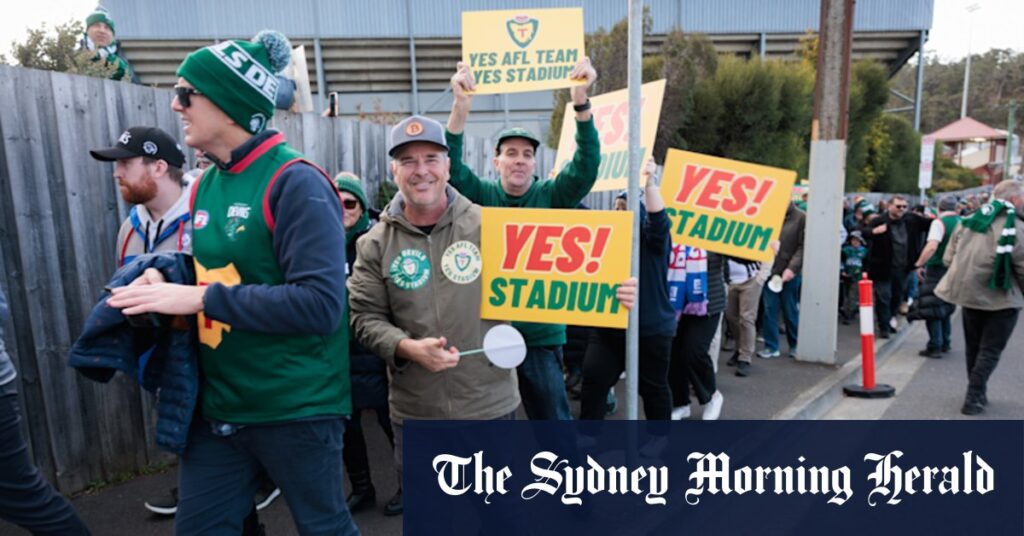Loading
Labor has ruled out doing a deal with The Greens to form government, but has left the door open to accepting supply and confidence from the minor party.
The party is predicted to hold either nine or 10 seats in the new parliament, with the Liberals remaining on at least 14. Eighteen seats are needed for a majority.
Greens MP Cassy O’Connor said Opposition Leader Dean Winter’s move to trigger the election, by moving the no confidence motion, had cost him votes.
The early election has delayed a key vote around the Macquarie Point stadium and brought fierce anti- and pro-stadium sentiment to the forefront of the campaign.
The stadium project – an AFL condition of a new Tasmanian team, The Devils – is backed by Labor and Liberals but opposed by the Greens and most independents.
For many, like Hobart resident Travis Price, the proposed stadium and the prospect of a Tasmanian AFL team have ignited a newfound interest in politics.
“The team and the stadium have probably been the first major thing that’s got me to actually follow along with the politicians and what’s important for the state,” Price said on Saturday at an election-day rally in support of the stadium.
He said he voted Liberal, seeing the party as the strongest advocates for the stadium’s completion.
His dad, James Price, said he was a rusted-on Labor voter. But this election, he instead voted Liberal and blames Labor for bringing about the election and putting the stadium plan in jeopardy.
“They’ve already spent a lot of money on the stadium, we can’t afford to have Labor come in with Greens or independents who don’t want a stadium,” he said.
However, not all football fans share the Prices’ enthusiasm for the current proposal. Sharyn White, while keen for Tasmania to have a stadium, believes the deal demanded by the AFL is unfair on the state. She hopes independents emerge as the big winners on election night.
“Our politicians didn’t negotiate us a good deal,” White said. “We need reasonable people who listen to expert advice.” She was frustrated that the stadium had dominated Tasmanian politics, overshadowing critical issues such as the lack of housing infrastructure, health reform, and education.
In 2023, Tasmania was granted a licence for its own AFL team, contingent on the construction of a new 23,000-seat roofed stadium. But the no stadium, no team ultimatum has since been embroiled in political turmoil, with recent polling showing roughly 60 per cent of Tasmanians oppose the contentious development.
Sharyn White loves football, but she doesn’t like the stadium project.Credit: Peter Mathew
In his final pitch on Friday, Liberal Premier Jeremy Rockliff said Opposition Leader Dean Winter had put the state’s progress at risk when he “forced this unnecessary election”.
“A majority Liberal government is the only way to keep Tasmania moving forward with certainty, stability, and efficiency,” Rockliff said, warning a Labor government would rely on the Greens.
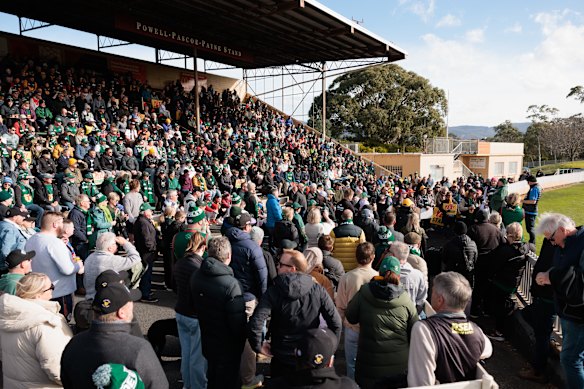
The stadium plan has become the main issue for footy-mad TasmaniaCredit: Peter Mathew
But Winter said Tasmanians had “nothing to show” for 11 years of Liberal government.
“They’ve mismanaged major projects like the Spirits [ferry roll-out], our finances are the worst in the nation, health waitlists are double the size they were a decade ago,” he said.
While Labor has pledged not to do a formal deal with the Greens, Winter would likely need the minor party’s support to form government, a scenario YouGov data suggests voters would prefer. According to the poll, 55 per cent of Tasmanians would choose Winter as premier in a hung parliament.
Both Labor and The Liberals back the stadium, but with independents and anti-stadium Greens likely to play a key role in the event of a hung parliament, there is the possibility they will demand the stadium plans be dropped or altered.
Just hours after polls opened, more than a thousand pro-stadium footy fans made their views heard, marching to North Hobart Oval.
Aaron Hilder attended with his family and said a stadium would be a game changer for everyone in the state and the loud opposition was frustrating.
“It’s so close, but we need to get it over the line,” he said.
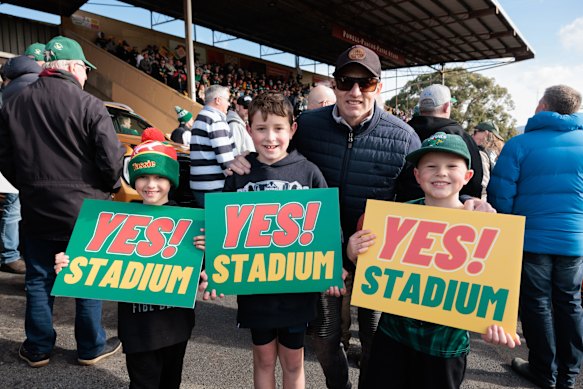
Stadium fans Hudson, Noah and Jack with Jack’s dad Aaron Hilda at the start of a march on Saturday in support of Hobart’s proposed AFL stadium.Credit: Peter Mathew
High-profile independent Kristie Johnston said the stadium project was a key “filter question” for voters.
“We can’t afford it, we don’t need it, and it doesn’t fit on the site,” she told this masthead.
“As soon as I say no [to the stadium] they are engaged and wanting to know more about what else I stand for in terms of health, housing and education.
“So it’s not necessarily a referendum on the stadium, but it’s symbolic of the underlying issues about the future of the state.”
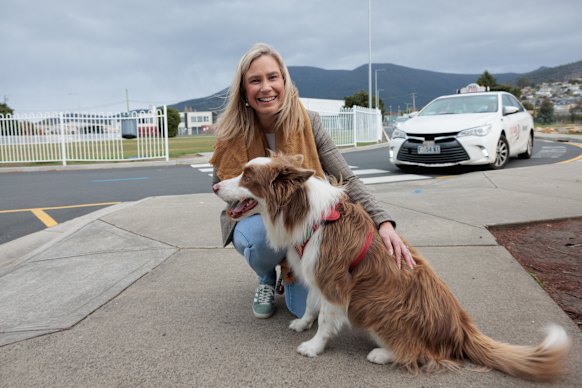
Independent candidate for Clark Kristie Johnston opposes the stadium plan.Credit: Peter Mathew
Johnston accused the AFL of treating Tasmania with “great disdain” and said the next parliament must “stand firm … and demand a team, but not be dictated by the AFL in terms of what the conditions for that are”.
For many Tasmanians, the debate over the proposed stadium became a reflection of their broader values.
As she cast her vote at a polling station on Saturday, Hobart resident Heidi Mirtl said the highly visible debate took on profound significance.
“It is the thing that becomes the centrepiece around what underpins the values people hold when they vote,” she said. Mirtl, who believes the state cannot afford the project, cited the Greens’ opposition to the stadium as a key reason for her vote, arguing the priority must be the “desperate need for housing and addressing poverty”.
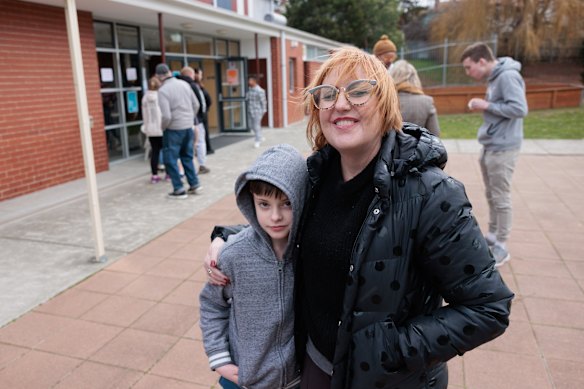
Heidi Mirtl, with her son Em, says Tasmania can’t afford the stadium project.Credit: Peter Mathew
Influential pro-stadium independent David O’Byrne, a former Labor leader, said the prospect of a local AFL team had made politics “white-hot” and had motivated a new cohort of voters.
“The issue crosses ideological lines,” O’Byrne said. “There is a group that is motivated to vote strategically in support of something they feel strongly about, which is essentially delivering a Tasmanian football club that we have wanted for a generation.”
Tasmania, along with the ACT, uses the Hare-Clark electoral system in the lower house. A form of proportional representation, it was recently expanded so that seven MPs, instead of five, are elected from each of the state’s five electorates. This lowers the quota of votes needed to win a seat, boosting the prospects of minor parties and independents.
O’Byrne, who said Labor was being blamed by many voters for causing an unnecessary election, pledged to work constructively with whoever can form government if he was re-elected.
“I won’t dangle that as a threat,” he said. “Part of the problem is you’ve had a couple of independents who provided that supply and confidence last time but, all of a sudden, made everything a test of the relationship and therefore [the government] collapsed.”
O’Byrne resigned from Labor after failing to win preselection for the 2024 election following an internal investigation into a sexual harassment allegation from 10 years prior. The investigation found O’Byrne’s behaviour was “inappropriate and wrong” but did not constitute sexual harassment. He was re-elected in 2024 with the highest primary vote of any independent candidate.
Cut through the noise of federal politics with news, views and expert analysis. Subscribers can sign up to our weekly Inside Politics newsletter.
Read the full article here
